 Tìm kiếm
Tìm kiếm
Phần thứ mười Bộ luật tố tụng dân sự 2015: Xử lý hành vi cản trở hoạt động tố tụng dân sự; khiếu nại, tố cáo trong tố tụng dân sự
| Số hiệu: | 92/2015/QH13 | Loại văn bản: | Luật |
| Nơi ban hành: | Quốc hội | Người ký: | Nguyễn Sinh Hùng |
| Ngày ban hành: | 25/11/2015 | Ngày hiệu lực: | 01/07/2016 |
| Ngày công báo: | 29/12/2015 | Số công báo: | Từ số 1251 đến số 1252 |
| Lĩnh vực: | Thủ tục Tố tụng | Tình trạng: | Còn hiệu lực |
TÓM TẮT VĂN BẢN
Bộ luật tố tụng dân sự 2015 được ban hành ngày 25/11/2015 với nhiều quy định về thẩm quyền của Tòa án; cơ quan tiến hành tố tụng, người tiến hành tố tụng; thành phần giải quyết việc dân sự; người tham gia tố tụng; chứng minh, chứng cứ; biện pháp khẩn cấp tạm thời; chi phí tố tụng;…
Bộ luật tố tụng dân sự năm 2015 gồm 10 Phần, 42 Chương, 517 Điều (Thay vì Bộ luật Tố tụng dân sự 2004 chỉ gồm 9 Phần, 36 Chương, 418 Điều). BLTTDS 2015 có bố cục gồm các Phần sau:
- Những quy định chung
- Thủ tục giải quyết vụ án tại Tòa án cấp sơ thẩm
- Thủ tục giải quyết vụ án tại Tòa án cấp phúc thẩm
- Giải quyết vụ án dân sự theo thủ tục rút gọn
- Thủ tục xét lại bản án, quyết định đã có hiệu lực pháp luật
- Thủ tục giải quyết việc dân sự
- Thủ tục công nhận và co thi hành tại Việc Nam hoặc không công nhận bản án, quyết định dân sự của Tòa án nước ngoài; công nhận và cho thi hành phán quyết của trọng tài nước ngoài
- thủ tục giải quyết vụ việc dân sự có yếu tố nước ngoài
- Thi hành Bản án, quyết định dân sự của Tòa án
- Xử lý hành vi cản trở hoạt động tố tụng, khiếu nại, tố cáo trong tố tụng
Theo đó, Bộ luật TTDS 2015 có những điểm sau đáng chú ý:
- Bổ sung mới quy định về Giải quyết vụ việc dân sự trong trường hợp chưa có điều luật để áp dụng:
+ Thẩm quyền của Tòa án thụ lý, giải quyết vụ việc dân sự trong trường hợp chưa có điều luật để áp dụng được thực hiện theo các điều từ Điều 35 đến Điều 41 của Bộ luật tố tụng dân sự năm 2015.
+ Trình tự, thủ tục thụ lý, giải quyết vụ việc dân sự theo Bộ luật số 92/2015/QH13.
+ Nguyên tắc giải quyết vụ việc dân sự trong trường hợp chưa có điều luật để áp dụng thực hiện theo Điều 45 Luật này về việc áp dụng tập quán, áp dụng tương tự pháp luật, áp dụng các nguyên tắc cơ bản của pháp luật dân sự, án lệ, lẽ công bằng.
- Phiên họp kiểm tra việc giao nộp, tiếp cận, công khai chứng cứ và hòa giải
Thẩm phán tiến hành mở phiên họp kiểm tra việc giao nộp, tiếp cận, công khai chứng cứ và hòa giải giữa các đương sự. Trước khi tiến hành phiên họp, Thẩm phán phải thông báo cho đương sự, người đại diện hợp pháp của đương sự, người bảo vệ quyền và lợi ích hợp pháp của đương sự về thời gian, địa điểm tiến hành phiên họp và nội dung của phiên họp.
- Phát hiện và kiến nghị sửa đổi, bổ sung hoặc hủy bỏ văn bản quy phạm pháp luật tại Điều 221 Bộ luật tố tụng dân sự 2015
Trong quá trình giải quyết vụ án dân sự, nếu phát hiện văn bản quy phạm pháp luật liên quan đến việc giải quyết vụ án dân sự có dấu hiệu trái với Hiến pháp, luật, nghị quyết của Quốc hội, pháp lệnh, nghị quyết của Ủy ban thường vụ Quốc hội, văn bản quy phạm pháp luật của cơ quan nhà nước cấp trên thì Tòa án thực hiện như sau:
+ Trường hợp chưa có quyết định đưa vụ án ra xét xử thì Thẩm phán được phân công giải quyết vụ án báo cáo và đề nghị Chánh án Tòa án đang giải quyết vụ án có văn bản đề nghị Chánh án Tòa án nhân dân tối cao kiến nghị cơ quan nhà nước có thẩm quyền xem xét sửa đổi, bổ sung hoặc bãi bỏ văn bản quy phạm pháp luật;
+ Trường hợp đã có quyết định đưa vụ án ra xét xử hoặc vụ án đang được xem xét tại phiên tòa hoặc đang được xét xử theo thủ tục giám đốc thẩm, tái thẩm thì Hội đồng xét xử tạm ngừng phiên tòa theo quy định tại điểm e khoản 1 Điều 259 của Bộ luật này và báo cáo Chánh án Tòa án đang giải quyết vụ án có văn bản đề nghị Chánh án Tòa án nhân dân tối cao kiến nghị cơ quan nhà nước có thẩm quyền xem xét sửa đổi, bổ sung hoặc bãi bỏ văn bản quy phạm pháp luật.
- Điều 247 Bộ Luật 92/2015/QH13 quy định rõ nội dung và phương thức tranh tụng tại phiên tòa
+ Tranh tụng tại phiên tòa bao gồm việc trình bày chứng cứ, hỏi, đối đáp, trả lời và phát biểu quan điểm, lập luận về đánh giá chứng cứ, tình tiết của vụ án dân sự, quan hệ pháp luật tranh chấp và pháp luật áp dụng để giải quyết yêu cầu của các đương sự trong vụ án.
- Bổ sung phần thứ tư về Giải quyết vụ án dân sự theo thủ tục rút gọn quy định:
+ Điều kiện áp dụng thủ tục rút gọn
+ Quyết định đưa vụ án ra xét xử theo thủ tục rút gọn
+ Phiên tòa xét xử theo thủ tục rút gọn
+ Thủ tục phúc thẩm rút gọn đối với bản án, quyết định của Tòa án cấp sơ thẩm bị kháng cáo, kháng nghị
Bộ luật tố tụng DS năm 2015 có hiệu lực từ ngày 01/07/2016 trừ một số quy định thì có hiệu lực từ ngày 01/01/2017, cụ thể tại Khoản 1 Điều 517 Bộ luật TTDS năm 2015.
Văn bản tiếng việt
Văn bản tiếng anh
HANDLING ACTS OF OBSTRUCTING CIVIL PROCEEDINGS; COMPLAINTS AND DENUNCIATIONS IN CIVIL PROCEDURES
HANDLING ACTS OF OBSTRUCTING CIVIL PROCEEDINGS
Article 489. Handling acts of obstructing the verification and collection of evidences by proceeding officers
Those who commit one of the following acts shall, depending on the nature and severity of the violations, be disciplined, be imposed administrative penalties or face criminal prosecution as prescribed in law:
1. Forging or destroying important exhibits, thus obstructing the resolution of cases by courts;
2. Refusing to provide or provide untruthful testimonies or providing false materials when acting as witnesses;
3. Refusing to produce results of expertise of refusing to provide information without good and sufficient reason or produce untruthful expertise results;
4. Intentionally giving untruthful interpretation;
5. Failing to assign a person to join the Price Assessment Council at the request of the Court without a plausible reason; failing to perform the duties of the Price Assessment Council without a plausible reason;
6. Obstructing a procedure-conducting person to make on-site inspection and appraisal, conduct assessment and/or expertise or verify or collect other evidences in accordance with this Code;
7. Deceiving, bribing, threatening, forcing or using force to prevent a witness from giving testimonies, or compelling others to deceitfully act as a witness;
8. Deceiving, bribing, threatening, forcing, or using force to prevent an expert witness from performing his/her duty, or compelling him/her to make an untruthful conclusion;
9. Deceiving, bribing, threatening, forcing, or using force to prevent an interpreter from performing his/her duty or compelling him/her to give untruthful, biased or wrong interpretation.
Article 490. Handling measures applicable to witnesses who are intentionally not present under courts’ subpoenas
1. In cases where witnesses or the interpreters have been duly summoned by Courts but have deliberately declined to go to Courts or to be present in Court sessions or meeting without plausible reasons and their absence caused obstacles to the collection and/or verification of evidences or the adjudication of cases, they shall face administrative sanction according to law provisions.
2. In cases specified in clause 1 of this Article, the Courts shall be entitled to issue decisions to escort the witness to the Court sessions or meetings, unless the witnesses are minors. Decisions on escorting witnesses must clearly state the time and places of their issuance; the full names and positions of the persons issuing the decisions; the full names, dates of birth and residence places of the witnesses, the time and places for the witnesses to be present.
3. The public security offices having the task to enforce the Court decisions shall be in charge of escorting witnesses. Executors of such decisions must read out and explain them to the to be-escorted persons and make records on the escort.
Article 491. Handling of violations against the internal rules of Court sessions
1. Persons committing violations against the internal rules of Court sessions specified in Article 234 of this Code shall, depending on nature and severity of the violations, face administrative penalties imposed by the presiding Judges according to law provisions.
2. The presiding Judges shall be entitled to make decisions to compel the violators specified in clause 1 of this Article to leave the courtroom. Public security offices having the task to protect Court sessions or persons having the task to protect the order of the Court sessions shall enforce the presiding Judges’ decisions on forcible departures from Court rooms or admistrative custody against persons who cause disturbance in Court sessions.
3. In cases where persons violate the internal rules of Court sessions to such an extent that they must be liable to criminal prosecution, the Courts shall be entitled to institute criminal cases according to regulations on criminal procedures.
4. Provisions of this Article shall be also applicable to persons who commit violations in the Court’s meetings.
Article 492. Actions against acts offending or injuring the solemn and/or prestige of the Court, honor, dignity or health of proceeding officers or other persons carrying out duties at the request of the Court
Any person performing an act offending or injuring the solemn and/or prestige of the Court, honor, dignity or health of proceeding officers or other persons carrying out duties at the request of the Court shall, depending on nature and severity of the violations, be imposed administrative penalties or be liable to criminal prosecution according to law provisions.
Article 493. Actions against the issuance, sending, receiving, delivery or notice of procedural documents of the Court
Any person shall, depending on nature and severity of the violations, be imposed disciplinary penalties, administrative penalties or liable to criminal prosecution according to law provisions if he/she performs any of the following acts:
1. Fail to perform the issuance, sending, delivery or notice of procedural documents of the Court at the request of the Court without plausible reasons;
2. Destroy procedural documents of the Court that the Court assigned them to issue, deliver or notice;
3. Forge the results of the deliver or notice of procedural documents of the Court that are assigned;
4. Preclude the issuance, sending, Receiving, delivery or notice of procedural documents of the Court.
Article 494. Actions against acts preventing representatives of agencies, organizations or individuals from participating in procedures as requested by Courts
Those who threaten, assault, or take advantage of others’ dependence to prevent representatives of agencies, organizations or individuals from attending Court sessions or meetings as summoned by the Courts shall, depending on the nature and severity of their violations, be administratively sanctioned or be liable to criminal prosecution according to law provisions.
Article 495. Actions against acts of failing to executive Court decisions on provisions of documents and evidences to the Court or acts of reporting untruthful information in order to obstruct Court’s settlement of cases
1. Agencies, organizations or individuals that fail to execute the Court decision on provision of documents and evidences they are currently managing or keeping shall be administratively sanctioned in accordance with law.
2. Those who report untruthful information in order to obstruct the Court’s settlement of the case shall, depending on the nature and severity of their violations, be administratively sanctioned, administratively sanctioned or be liable to criminal prosecution in accordance with law.
Article 496. Actions against acts interfering in the settlement of civil cases
Those who use their influence to exert impacts in any form on the Judge or another member of the Trial Panel in order to make the settlement of the case biased or unlawful shall, depending on the nature and severity of their violations, be imposed disciplinary measures, be administratively sanctioned or be liable to criminal prosecution in accordance with law.
Article 497. Responsibilities of the procuracies in cases where the Courts institute criminal cases
1. In cases where the Courts institute criminal cases as stipulated in Clauses 3 and 4 Article 491 of this Code, within 15 days from the day on which the institution decisions are issued, the Courts shall forward to the competent procuracies the institution decisions and materials and evidences substantiating the criminal acts.
2. The procuracies shall be responsible for considering and settling according to provisions of the Criminal Procedure Code.
Article 498. Forms of penalty, competence, order and procedures for imposing penalties
Forms of penalty, competence, order and procedures for imposing administrative penalties on acts that obstruct civil procedure activities shall comply with provisions of the Law on Actions against administrative violations and relevant law provisions.
COMPLAINTS AND DENUNCIATIONS IN CIVIL PROCEDURES
Article 499. Decisions and acts in civil procedures which may be complained about
1. Agencies, organizations or individuals shall be entitled to complain about procedural decisions or acts of civil proceeding authorities/persons when there are grounds for presuming that such decisions or acts are illegal or infringe upon their legitimate rights and interests.
2. For first-instance, appellate, cassation or reopening judgments/decisions of Courts or other procedural decisions issued by civil proceeding officers, if being appealed against, complained about or petitioned, they shall be settled not according to the provisions of this Chapter but according to the provisions of corresponding chapters of this Code.
Article 500. Rights and obligations of complainants
1. Complainants shall have the following rights:
a) To lodge complaints by themselves or through their lawful representatives;
b) To lodge their complaints at any stage of the resolution of the cases;
c) To withdraw their complaints at any stage of the resolution of the cases;
d) To receive written replies on the acceptance of their complaints; to receive the complaint-resolving decisions;
dd) To have their legitimate rights or interests restored; to receive damages as provided for by law.
2. Complainants shall have the following obligations:
a) To lodge their complaints to the right persons who are competent to settle them;
b) To give truthful presentations of the cases, to supply information and documents to persons handling the complaints; to take responsibility before law for the contents of their presentations and the supply of such information and documents;
c) Not to abuse the right to complain to obstruct the procedural activities of the courts;
d) To abide by decisions and acts of presiding officers that they are complaining about during the complaining period;
dd) To strictly abide by the complaint-resolving decisions which have taken legal effect.
Article 501. Rights and obligations of the complained persons
1. The complained persons shall have the following rights:
a) To acquire knowledge about grounds for complaint of the complainants; to produce evidences of the legality of their procedural decisions or acts which are being complained about;
b) To receive decisions on the resolution of the complaints about their own procedural decisions or acts.
2. The complained persons shall have the following obligations:
a) To explain their procedural decisions or acts being complained about; to provide relevant information or documents when so requested by competent agencies, organizations or individuals;
b) To strictly abide by the decisions on the resolution of the complaints which have taken legal effect;
c) To compensate for damage, to reimburse or address the consequences caused by their illegal procedural decisions or acts as provided for by law.
Article 502. Statute of limitations for lodging complaints
The time limit specified in statute of limitation for lodging a complaint is 15 days as from the date the complainant receives or knows about the procedural decision/act which he/she deems illegal.
In cases where complainants cannot exercise their right to lodge their complaints within the time limit prescribed in this Article because of force majeure events or objective obstacles, the duration in which the force majeure events or objective obstacles exist shall not be counted into the statute of limitations for complaint.
Article 503. Forms of complaint
Complaint petitions must be made in writing. A written complaint petition must clearly state the date; full name and address of the complainant; complaint contents and reasons for the complaint, request of the complainant, signature or fingerprints of the complainant.
Article 504. Competence resolution of complaints against decisions/acts of proceeding officers
1. Complaints against decisions/acts of proceeding officers being Judges, Deputy-Chief Justices, Ombudspersons, Court clerks or People’s Jurors shall be settled by the competent Chief Justices of Courts being in charge of such civil cases.
Complaints against procedural decisions/acts of Chief Justices of Courts shall be settled by the competent Chief Justices of the immediately superior courts.
2. Complaints against decisions/acts of proceeding officers being procurators, inspectors, deputy chairpersons of procuracies shall be settled by the chairpersons of the procuracies.
Complaints against procedural decisions/acts of chairpersons of procuracies shall be settled by competent chairpersons of the immediately superior procuracies.
3. Complaints against the first complaint-resolving decisions of the Chief Justices or the Chairpersons of procuracies provided for in clauses 1 and 2 of this Article shall be settled by the Chief Justices/Chairpersons of the immediately superior courts/procuracies.
Article 505. Time limit for resolution of complaints
Time limit for resolution of first complaints shall be 15 days from the day on which the courts/procuracies received the complaint petitions. If necessary, for complicated cases and matters, time limit for resolution of complaints can be extended by not exceeding 15 days calculated from the day on which the time limit for resolution of complaints expires.
Article 506. Contents of decisions on first complaint resolution
1. Persons who resolve complaints for the first time must issue written decisions on resolution of the complaints. A decision on resolution of a complaint shall include the following information:
a) Date of issuing the decision;
b) Name and address of the complainant and the complained person;
c) Complained matters;
d) Result of the verification of the complained matters;
dd) Legal grounds for resolution of the complaint;
e) Decision on first complaint resolution.
2. First complaint-resolving decisions must be sent to the complainants and relevant individuals, agencies and organizations. If the decisions are issued by the Chief Justices of the courts, they must be sent to procuracies of the same levels.
Article 507. Procedures for second complaint resolution
1. Within 05 working days from the day on which the first complaint-resolving decisions are received, if the complainants disagree with such decisions, they may file complaints with competent persons for second complaint resolution.
2. The complaint petitions must be enclosed with copies of first complaint-resolving decisions and accompanying materials.
A written complaint petition must clearly state the date; full name and address of the complainant; complaint contents and reasons for the complaint; signature or fingerprints of the complainant.
3. A second complaint-resolving decision must include the following information:
a) Information specified in points a, b, c, d and dd clause 1 Article 506 of this Code;
b) Result of the first complaint resolution;
c) Conclusions about specific matters in the complaint petition and the resolution of the second complaint-resolving persons.
4. Second complaint-resolving decisions must be sent to the complainants and relevant individuals, agencies and organizations. If the decisions are issued by the Chief Justices of the courts, they must be sent to procuracies of the same levels.
5. Second complaint-resolving decisions shall be effective.
Article 508. Resolution of complaints against expertise activities in civil procedures
The resolution of complaints against expertise activities in civil procedures shall comply with law regulations on judicial expertise and relevant law provisions.
Article 509. Persons who have right to denounce
Individuals are entitled to denounce to competent agencies, organizations or individuals illegal acts of competent proceeding officers which cause or threaten to cause damage to the State’s interests or legitimate rights and interests of agencies, organizations or individuals.
Article 510. Rights and obligations of denouncers
1. Denouncers shall have the following rights:
a) To file their written denunciations or directly present denunciations to competent agencies, organizations or individuals;
b) To request that their full names, addresses and autographs be kept secret;
c) To request that the results of resolution of their denunciations be notified to them;
d) To request that competent agencies, organizations and individuals protect them when they are threatened, bullied or revenged.
2. Denouncers shall have the following obligations:
a) To honestly present the contents of their denunciations;
b) To clearly state their full names and addresses;
c) To take responsibility before law for untruthful denunciations.
Article 511. Rights and obligations of the denounced persons
1. Denounced persons shall have the following rights:
a) To be notified of the denunciation contents;
b) To produce evidences to prove that the denunciation contents are untrue;
c) To have their legitimate rights and interests that have been infringed upon restored; to have their honor restored; and to enjoy compensation for the damage caused by false denunciations;
d) To request competent agencies, organizations or individuals to handle persons who gave untruthful denunciations.
2. Denounced persons shall have the following obligations:
a) To explain their denounced acts; to provide relevant information and documents when so requested by competent agencies, organizations or individuals;
b) To strictly abide by the handling decisions of competent agencies, organizations or individuals;
c) To pay damages, reimburse or address consequences caused by their illegal civil procedural acts according to law provisions.
Article 512. Competence and time limit for resolution of denunciations
1. Denunciations of illegal acts of persons competent to conduct procedures of any competent agencies shall be settled by the heads of such agencies.
In cases where the denounced persons are courts’ Chief Justices, deputy-Chief Justices, chairpersons or deputy-chairpersons of the procuracies, the Chief Justices of the immediately superior Courts or the chairpersons of the immediately superior procuracies shall have responsibility to settle the cases.
The time limit for resolution of a denunciation shall not exceed 02 months as from the date on which the denunciation is accepted; for complicated cases, the time limit for denunciation resolution may be longer but shall not exceed 03 months.
2. Denunciations of illegal acts which show criminal signs shall be settled according to the provisions of the Criminal Procedure Code.
Article 513. Procedures for denunciation resolution
The procedures for resolution of denunciations shall comply with law regulations on denunciation.
Article 514. Responsibilities of persons competent to settle complaints/denunciations
1. Competent agencies, organizations or individuals shall, within the scope of their tasks and powers, have the responsibility to receive and promptly and properly settle complaints or denunciations; to strictly handle violators; to apply necessary measures to prevent possible damage or losses; to ensure strict execution of settling decisions and have to take legal responsibility for their decisions.
2. Those who are competent to settle complaints or denunciations but fail to settle them, show irresponsibility in settling them or settle them illegally shall, depending on the nature and severity of the violations, be disciplined or examined for penal liability; if causing damage, they must pay compensations therefor according to law provisions.
Article 515. Inspection and supervision of law observation in resolution of complaints and denunciations in civil procedures
The people’s procuracies shall inspect and supervise the law observance in the resolution of complaints and denunciations in civil procedures according to law provisions. The procuracies are entitled to request or recommend the Courts of the same and lower levels, responsible agencies, organizations and individuals to ensure that the settlement of complaints/denunciations is well grounded and lawful.
IMPLEMENTARY CLAUSE
Article 516. Amendment to a number of articles of the Labor Code No. 10/2012/QH13
1. Article 52 shall be amended as follows:
“Article 51. Competence to declare a labor contract to be invalid
People’s Courts shall be entitled to declare labor contracts to be invalid.”
2. Articles 223, 224, 225, 226, 227, 228, 229, 230, 231, 232 and 234 Section 5 Chapter XIV of the Labor Code No. 10/2012/QH13 shall be annulled.
1. This Code takes effect from July 01st, 2016, except for the following provisions related to provisions of the Civil Code No. 91/2015/QH13 that take effect from January 01st, 2017:
a) Provisions related to that the Courts must not refuse to resolve civil cases for the reasons that there are no applicable law provisions prescribed in clause 2 Article 4, Articles 43, 44 and 45 of this Code;
b) Provisions pertaining to persons with limited cognition or behavior control;
c) Provisions pertaining to the application of statute of limitations provided for in clause 2 Article 184 and point e clause 1 Article 217 of this Code;
d) Provisions pertaining to legal entities being representatives or guardians.
2. The Civil Procedure Code No. 24/2004/QH11 that has been amended according to the Law No. 65/2011/QH12 shall expire since this Code comes into effect, except for provisions of Article 159 and point h clause 1 Article 192 that shall be effective until the end of December 31st, 2016.
Văn bản liên quan
Cập nhật
Điều 111. Quyền yêu cầu áp dụng biện pháp khẩn cấp tạm thời
Điều 113. Trách nhiệm do áp dụng biện pháp khẩn cấp tạm thời không đúng
Điều 120. Kê biên tài sản đang tranh chấp
Điều 127. Cấm hoặc buộc thực hiện hành vi nhất định
Điều 128. Cấm xuất cảnh đối với người có nghĩa vụ
Điều 133. Thủ tục áp dụng biện pháp khẩn cấp tạm thời
Điều 136. Buộc thực hiện biện pháp bảo đảm
Điều 137. Thay đổi, áp dụng bổ sung biện pháp khẩn cấp tạm thời
Điều 291. Quyết định áp dụng, thay đổi, hủy bỏ biện pháp khẩn cấp tạm thời
Bài viết liên quan
Chia tài sản ly hôn có yếu tố nước ngoài như thế nào mới nhất 2025?

Chia tài sản ly hôn có yếu tố nước ngoài như thế nào mới nhất 2025?
Khi hôn nhân giữa người Việt Nam và người nước ngoài tan vỡ, việc chia tài sản trở thành một vấn đề phức tạp đòi hỏi sự am hiểu sâu sắc về pháp luật của cả hai quốc gia. Bài viết này sẽ giúp bạn hiểu rõ hơn về quy trình chia tài sản trong trường hợp ly hôn có yếu tố nước ngoài, đặc biệt là trong năm 2025. 20/12/2024Thuận tình ly hôn với người nước ngoài hết bao nhiêu mới nhất 2025?
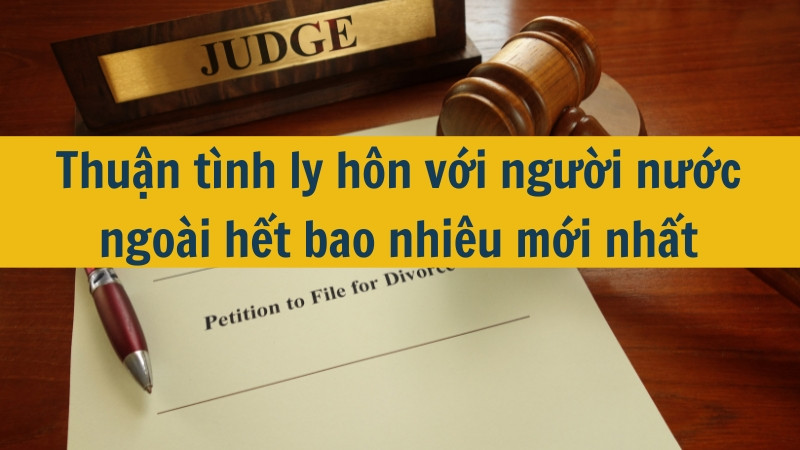
Thuận tình ly hôn với người nước ngoài hết bao nhiêu mới nhất 2025?
Quy trình ly hôn vốn đã phức tạp, lại càng trở nên nan giải hơn khi có sự tham gia của công dân nước ngoài. Vậy, thủ tục ly hôn thuận tình với người nước ngoài sẽ mất bao lâu để hoàn tất? Bài viết này sẽ giúp bạn giải đáp thắc mắc này, cung cấp những thông tin mới nhất về thời gian giải quyết vụ án ly hôn thuận tình có yếu tố nước ngoài tại Việt Nam năm 2025. 20/12/2024Trình tự, thủ tục chuẩn bị hồ sơ thuận tình ly hôn với người nước ngoài mới nhất 2025
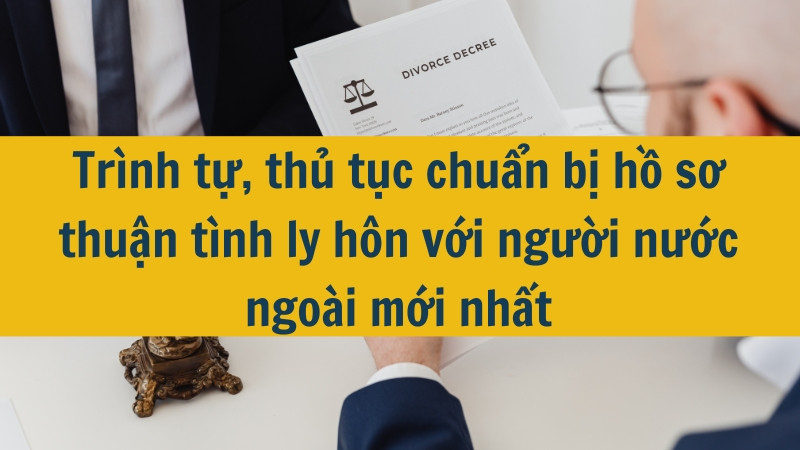
Trình tự, thủ tục chuẩn bị hồ sơ thuận tình ly hôn với người nước ngoài mới nhất 2025
Việc ly hôn với người nước ngoài ngày càng trở nên phổ biến trong xã hội hiện đại. Tuy nhiên, thủ tục ly hôn thuận tình với người nước ngoài khá phức tạp và đòi hỏi nhiều giấy tờ. Bài viết này sẽ hướng dẫn bạn chi tiết về trình tự, thủ tục và hồ sơ cần chuẩn bị khi muốn ly hôn thuận tình với người nước ngoài, giúp bạn nắm rõ quy trình và chuẩn bị đầy đủ trước khi tiến hành thủ tục. 20/12/2024Có được quyền ly hôn khi một bên ở nước ngoài không mới nhất 2025?
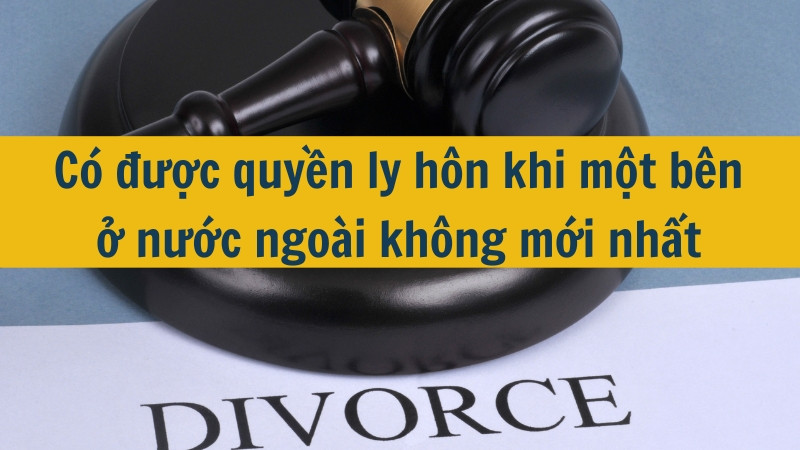
Có được quyền ly hôn khi một bên ở nước ngoài không mới nhất 2025?
Trong thời đại toàn cầu hóa, hôn nhân quốc tế ngày càng phổ biến. Tuy nhiên, không phải mối tình nào cũng có kết thúc viên mãn. Vậy, nếu một trong hai vợ chồng đang sinh sống ở nước ngoài, liệu có thể tiến hành thủ tục ly hôn hay không? Bài viết này sẽ giải đáp thắc mắc này, cung cấp thông tin chi tiết về quy định pháp luật mới nhất năm 2025. 20/12/2024Ly hôn đơn phương chồng đang ở nước ngoài mới nhất 2025?

Ly hôn đơn phương chồng đang ở nước ngoài mới nhất 2025?
Việc ly hôn với chồng đang ở nước ngoài là một vấn đề khá phức tạp và đòi hỏi nhiều thủ tục. Bài viết này sẽ hướng dẫn bạn chi tiết về quy trình ly hôn đơn phương khi chồng đang ở nước ngoài, giúp bạn hiểu rõ hơn về quyền lợi và nghĩa vụ của mình. 20/12/2024Hồ sơ và thủ tục ly hôn đơn phương có yếu tố nước ngoài năm 2025
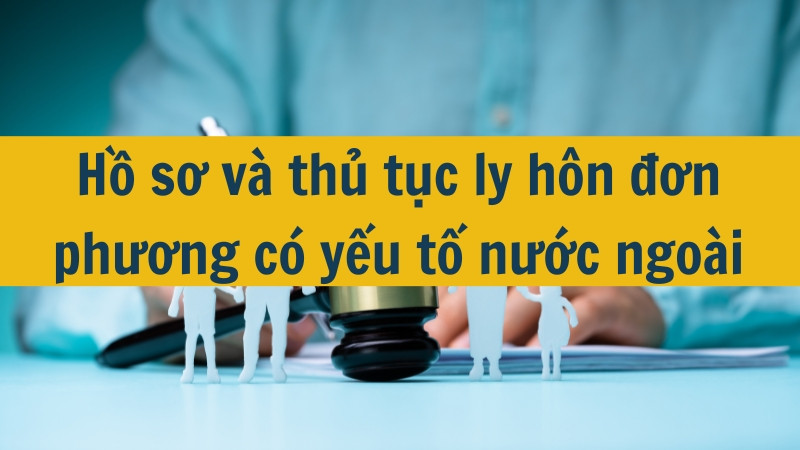
Hồ sơ và thủ tục ly hôn đơn phương có yếu tố nước ngoài năm 2025
Việc ly hôn với người nước ngoài ngày càng trở nên phổ biến trong xã hội hiện đại. Tuy nhiên, thủ tục ly hôn đơn phương có yếu tố nước ngoài lại khá phức tạp và đòi hỏi nhiều giấy tờ. Bài viết này sẽ cung cấp thông tin chi tiết về hồ sơ và thủ tục ly hôn đơn phương có yếu tố nước ngoài năm 2025, giúp bạn nắm rõ quy trình và chuẩn bị đầy đủ trước khi tiến hành thủ tục. 20/12/2024Người nước ngoài có được ly hôn ở Việt Nam không mới nhất 2025?
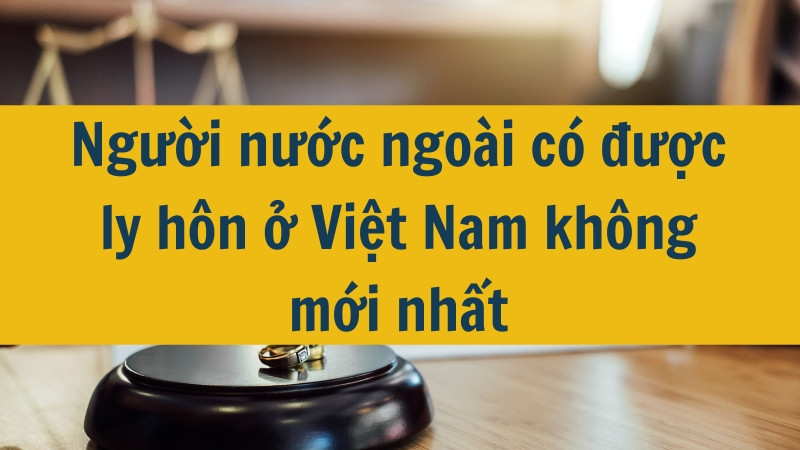
Người nước ngoài có được ly hôn ở Việt Nam không mới nhất 2025?
Việc ly hôn giữa công dân Việt Nam và người nước ngoài ngày càng trở nên phổ biến. Tuy nhiên, nhiều người vẫn băn khoăn không biết người nước ngoài có được quyền ly hôn tại Việt Nam hay không? Bài viết này sẽ giải đáp thắc mắc trên, cung cấp những thông tin chính xác và cập nhật nhất về vấn đề này vào năm 2025. 20/12/2024Ly hôn với người nước ngoài mất bao lâu mới nhất 2025?
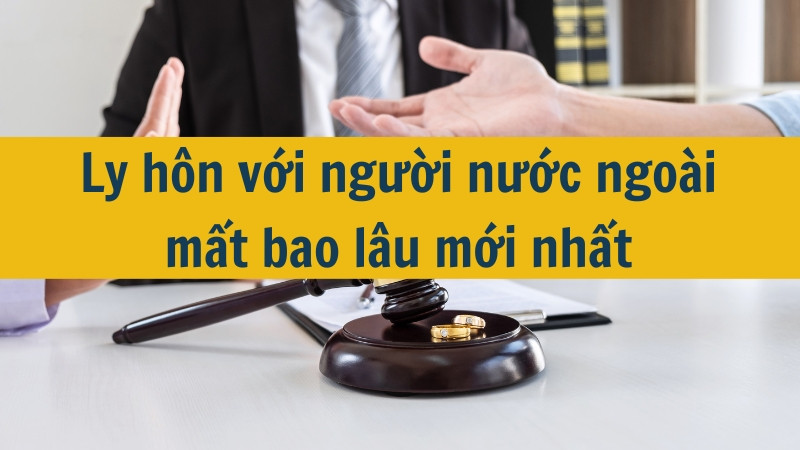
Ly hôn với người nước ngoài mất bao lâu mới nhất 2025?
Quy trình ly hôn vốn đã phức tạp, lại càng trở nên nan giải hơn khi có sự tham gia của công dân nước ngoài. Vậy, việc ly hôn với người nước ngoài sẽ mất bao lâu để hoàn tất thủ tục? Bài viết này sẽ giúp bạn giải đáp thắc mắc này, cung cấp những thông tin mới nhất về thời gian giải quyết vụ án ly hôn có yếu tố nước ngoài tại Việt Nam năm 2025. 20/12/2024Thẩm quyền giải quyết ly hôn với người nước ngoài mới nhất 2025
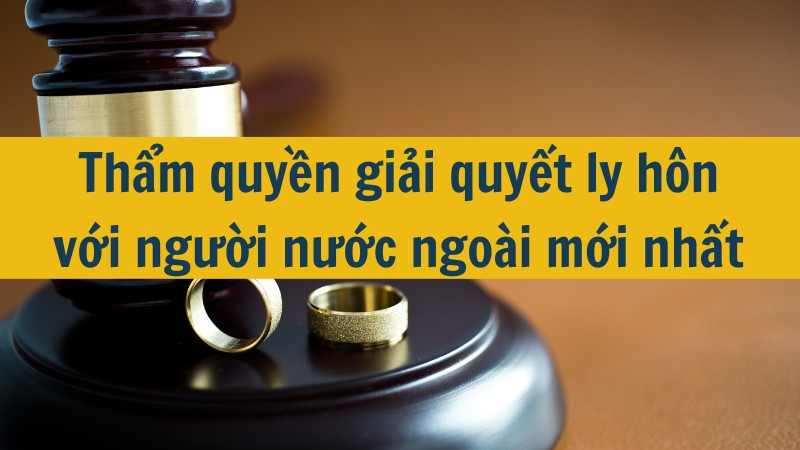
Thẩm quyền giải quyết ly hôn với người nước ngoài mới nhất 2025
Trong bối cảnh hội nhập quốc tế ngày càng sâu rộng, việc kết hôn giữa công dân Việt Nam và người nước ngoài trở nên phổ biến hơn. Tuy nhiên, khi hôn nhân đổ vỡ, vấn đề về thẩm quyền giải quyết ly hôn lại đặt ra nhiều thách thức. Bài viết này sẽ đi sâu phân tích các quy định mới nhất về thẩm quyền giải quyết ly hôn với người nước ngoài tại Việt Nam năm 2025, nhằm cung cấp thông tin hữu ích cho những người đang gặp phải tình huống này. 20/12/2024Mẫu đơn ly hôn với người nước ngoài và hướng dẫn chi tiết cách viết mới nhất 2025?
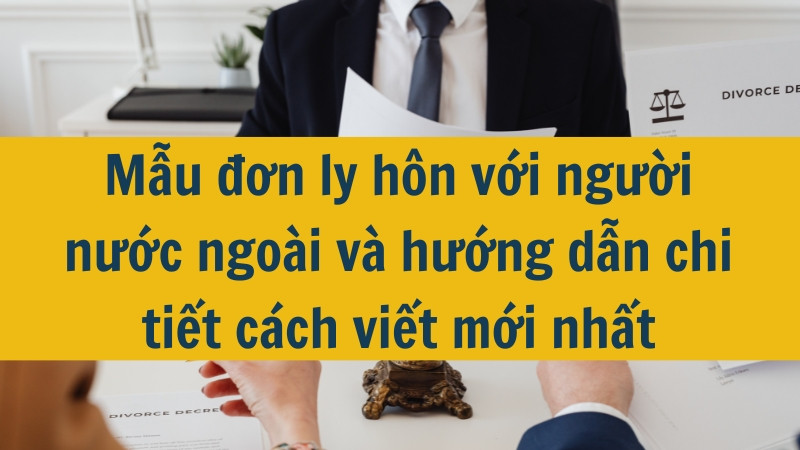

 Bộ luật tố tụng dân sự 2015 (Bản Word)
Bộ luật tố tụng dân sự 2015 (Bản Word)
 Bộ luật tố tụng dân sự 2015 (Bản Pdf)
Bộ luật tố tụng dân sự 2015 (Bản Pdf)